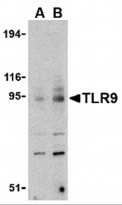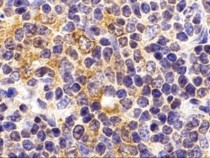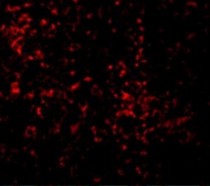ARG54946
anti-TLR9 antibody
anti-TLR9 antibody for ELISA,ICC/IF,IHC-Formalin-fixed paraffin-embedded sections,Western blot and Human,Mouse
Immune System antibody; Signaling Transduction antibody
Overview
| Product Description | Rabbit Polyclonal antibody recognizes TLR9 |
|---|---|
| Tested Reactivity | Hu, Ms |
| Tested Application | ELISA, ICC/IF, IHC-P, WB |
| Host | Rabbit |
| Clonality | Polyclonal |
| Isotype | IgG |
| Target Name | TLR9 |
| Antigen Species | Human |
| Immunogen | Synthetic peptide (16 aa) within aa. 960-1010 of Human TLR9. |
| Conjugation | Un-conjugated |
| Alternate Names | CD289; Toll-like receptor 9; CD antigen CD289 |
Application Instructions
| Application Suggestion |
|
||||||||||
|---|---|---|---|---|---|---|---|---|---|---|---|
| Application Note | * The dilutions indicate recommended starting dilutions and the optimal dilutions or concentrations should be determined by the scientist. | ||||||||||
| Positive Control | Mouse Spleen Tissue Lysate |
Properties
| Form | Liquid |
|---|---|
| Purification | Affinity purification with immunogen. |
| Buffer | PBS and 0.02% Sodium azide |
| Preservative | 0.02% Sodium azide |
| Concentration | 1 mg/ml |
| Storage Instruction | For continuous use, store undiluted antibody at 2-8°C for up to a week. For long-term storage, aliquot and store at -20°C or below. Storage in frost free freezers is not recommended. Avoid repeated freeze/thaw cycles. Suggest spin the vial prior to opening. The antibody solution should be gently mixed before use. |
| Note | For laboratory research only, not for drug, diagnostic or other use. |
Bioinformation
| Database Links | |
|---|---|
| Gene Symbol | TLR9 |
| Gene Full Name | toll-like receptor 9 |
| Background | TLR9 Antibody: Toll-like receptors (TLRs) are evolutionarily conserved pattern-recognition molecules resembling the toll proteins that mediate antimicrobial responses in Drosophila. These proteins recognize different microbial products during infection and serve as an important link between the innate and adaptive immune responses. TLR9 forms a subfamily along with TLR7 and TLR8 that recognize viral RNA and CpG DNA sequences and are localized in intracellular acidic compartments such as the phagolysosome. Unlike other TLRs which act through adaptor molecules such as TOLLIP, TIRAP, TRIF, and MyD88 to activate various kinases and transcription factors to respond to potential infection, TLR9 is strictly dependent on MyD88. |
| Function | Key component of innate and adaptive immunity. TLRs (Toll-like receptors) control host immune response against pathogens through recognition of molecular patterns specific to microorganisms. TLR9 is a nucleotide-sensing TLR which is activated by unmethylated cytidine-phosphate-guanosine (CpG) dinucleotides. Acts via MYD88 and TRAF6, leading to NF-kappa-B activation, cytokine secretion and the inflammatory response. Controls lymphocyte response to Helicobacter infection. [UniProt] |
| Research Area | Immune System antibody; Signaling Transduction antibody |
| Calculated MW | 116 kDa |
| PTM | Activated by proteolytic cleavage of the flexible loop between repeats LRR14 and LRR15 within the ectodomain. Cleavage requires UNC93B1. Proteolytically processed by first removing the majority of the ectodomain by either asparagine endopeptidase (AEP) or a cathepsin followed by a trimming event that is solely cathepsin mediated and required for optimal receptor signaling. |
Images (3) Click the Picture to Zoom In
-
ARG54946 anti-TLR9 antibody WB image
Western blot: mouse spleen cell lysate stained with ARG54946 anti-TLR9 antibody at (A) 0.5 and (B) 1 ug/ml dilution.
-
ARG54946 anti-TLR9 antibody IHC image
Immunohistochemistry: TLR9 in mouse spleen cells stained with ARG54946 anti-TLR9 antibody at 2 ug/ml dilution.
-
ARG54946 anti-TLR9 antibody ICC/IF image
Immunofluorescence: mouse spleen cells stained with ARG54946 anti-TLR9 antibody at 10 ug/ml dilution.








